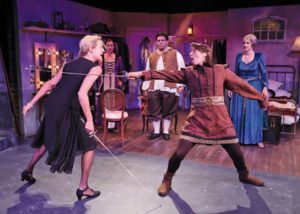Shakespeare’s Hamlet is not the manliest of tragic heroes. When the ghost of his father, the former King Hamlet of Denmark, accuses his brother Claudius, now king and Hamlet’s stepdad (after marrying Hamlet’s mom, Gertrude), of murder and demands revenge, Hamlet, in a princely snit, contemplates the value of staying alive, then schemes in passive-aggressive ways to execute justice.

Tormented though he may be, playing Hamlet — one of the most coveted roles in English theater — is still the lofty ambition of actors both male and — as Sarah Schulman and her new play, The Lady Hamlet, at the Provincetown Theater through July 21, would have it — female.
Schulman’s play, which is set in New York City in 1920, focuses on two stage divas who are each convinced that her portrayal of Hamlet is the most dazzling and brilliant of all time.
One, Miss Margo Stayden Burns (Jennifer Van Dyck), runs her own theater company and performs Hamlet as a woman (not as an actress in male drag). She’s an unabashed lesbian — anachronistically so, even in the “anything goes” Jazz Age time frame — who has cast her female lover, Frances Richards (Laura Scribner), as Gertrude. As the play opens, Margo learns onstage that her Ophelia (Hamlet’s love interest) has skipped town with a stagehand. Back in her dressing room, she tries to figure out how to replace her.
The other diva is Margo’s idol, Madame Helene de Montpelier (Kate Levy), a grand, imperious Parisian thespian who resembles Sarah Bernhardt. Helene has won praise for her portrayal of Hamlet as a man (as Bernhardt did), and she’s being lured to move the production to New York by Leo Lefkowitz (John Shuman), a producer with no pretenses about art. Unlike Bernhardt, who was Jewish, illegitimate, and a serial lover of men, Helene, like Margo, is a lesbian who spews ethnic prejudices as if it were her patrician birthright.
Helene’s lover is Mrs. Clara Shaw (Anne Stott), who approaches Margo as a writer interested in her company, though, in fact, she’s a spy for Helene. Helene is curious about this scrappy New York production of Hamlet with a woman in the lead role, viewing it as potential competition for a production of her own. When Clara shows up to interview Margo, Margo, instantly smitten, offers her the opportunity to become the new Ophelia.

Clara, whose husband always seems to be conveniently absent, is intrigued. Not only would she become Helene’s undercover eyes and ears, but she would get a chance to act with Margo, whose talent and bold approach impress her. Thus, the triangular farce ensues.
Clara and Leo are the go-betweens in the rivalry between Margo and Helene, who represent opposing sides of the theatrical spectrum. Margo, full of swashbuckling, can-do energy, has the spirit of a revolutionary: she wants, as a woman and performer, to be as heroic as any man of action. Helene, on the other hand, sees theater less as a political instrument than as a craft she raises to the level of art. Hamlet, to her, is simply a role.
Schulman turns the philosophical conflict and petty jealousies between Margo and Helene and the rest of the cast into a raucous Elizabethan comedy with modernist values. David Drake, the artistic director of the Provincetown Theater, helped to develop the play with Schulman and directs this world premiere production with a combination of boundless energy and intellectual rigor.
He has assembled a splendid cast to bring it to life. Van Dyck, as Margo, has the force of will that allows the character to transcend the limitations of the historical period. Margo is impulsive and irrepressible, brave and mercurial. She can act with narcissistic obliviousness to the feelings of others, and, in the next moment, be loving and generous. Van Dyck makes perfect sense of it.
Levy, as Helene, has magnetic grace and poise — she looks the part of an icon, with a haughty demeanor and shrewd intelligence. She gives the many sides of Helene the understated passion they require. Stott, as Clara, builds in confidence as the play progresses, much as her character does. In her glam wardrobe (thanks to costume designer Carol Sherry), she observes the spectacle of her outsized mentors with awe and a touch of skepticism, and ultimately arrives at a synthesis — a modern feminist in the making.
The rest of the cast — Shuman, as Leo Lefkowitz; Scribner, as Frances; and Brandon Cordeiro, as Sam Pinsky, another member of Margo’s troupe — handle the comic patter, physical antics, and more serious moments with expert timing and flair.
The set, by the Provincetown Theater’s gifted scenic designer, Ellen Rousseau, is marvelously compact, melding three locations (onstage; Margo’s dressing room and living quarters; and a restaurant) into one. A classical proscenium arch is sheared off halfway above the stage, giving The Lady Hamlet a symbolic division — between past and present, public and private.
Schulman straddles that division with heart and wit. In her hands, a moody Shakespearean tragedy becomes a springboard to examining gender roles and the women (queer women, that is) who inhabit them. And poor Hamlet, in his torment, is almost completely beside the point.
Editor’s note: An earlier version of this review, published in print on July 7, 2022, erroneously identified Hamlet’s father as Horatio. The dead king’s name was Hamlet. Horatio was Hamlet’s faithful friend in Shakespeare’s play.
To She, or Not to She
The event: World premiere production of The Lady Hamlet, a play by Sarah Schulman
The time: Through July 21, Monday through Thursday (and Friday, July 8) at 7 p.m.
The place: Provincetown Theater, 238 Bradford St.
The cost: $40 general admission, at provincetowntheater.org or 508-487-7487
